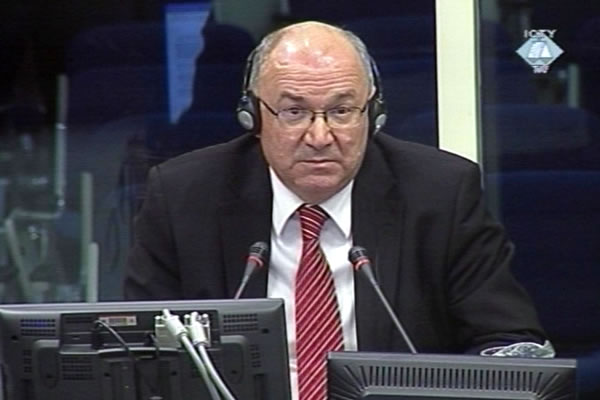Home
SERBIAN COMPLAINTS AND INTERNATIONAL CRITICISM WERE ‘EXAGGERATED’
Former Croatian foreign minister Mate Granic explained how in 1995 he dealt with ‘false’, ‘exaggerated’ or ‘even tendentious’ international complaints about the situation in Krajina during and after Operation Storm
 Mate Granić, svjedok odbrane Mladena Markača
Mate Granić, svjedok odbrane Mladena Markača General Ante Gotovina’s counsel today cross-examined former Croatian foreign minister Mate Granic, in some respects supporting the prosecution case, by showing a series of documents that were quite unfavorable to the defense. In the course of the trial so far, such documents have mainly been used by the prosecution. Granic is testifying in the defense of the former Croatian Special Police commander Mladen Markac, who is on trial, together with Gotovina and Cermak, for their alleged participation in the joint criminal enterprise aimed at the permanent elimination of Serbs from Krajina in the summer of 1995, during and after Operation Storm.
The defense counsel first showed the minutes from a meeting in President Tudjman’s office on 11 August 1995. At the meeting, interior minister Ivan Jarnjak accuses Serb politician Milorad Pupovac of ‘making a fuss’ because he described the situation with Serb refugees as catastrophic. ‘That son of a bitch’ Veljko Dzakula supported Pupovac’s claims, Jarnjak complained. When he was asked why Jarnjak was angry with the Serb representatives, Granic said that Jarnjak thought that they ‘exaggerated the problems’ by blowing up the number of refugees.
However, the complaints about the situation in Krajina during and after Operation Storm didn’t come only from Serb political representatives: the international community also raised objections. In August 1995, Swedish mediator Carl Bildt raised his voice, accusing Croatia of ‘the barbaric shelling of Knin’. German foreign minister Klaus Kinkel ‘expressed his concern about the crimes in Krajina’. Jose Ayala-Lasso, UN high commissioner for human rights, in his report drafted on 18 August 1995 claimed that the Serb property ‘is systematically looted and destroyed’ in the presence of the Croatian Army; the police did not respond.
The Croatian authorities responded to such complaints mostly through letters signed by minister Granic. Carl Bildt was declared a persona non grata in Croatia. This happened, the witness clarified, because Bildt’s claims about the indiscriminate attacks on Knin were untrue. In late August 1995, Granic replied to his German colleague Kinkel, saying that his allegations about the crimes were based on ‘exaggerated or even deliberately tendentious reports’. There was no ethnic cleansing and no systematic crimes in Krajina, Granic wrote, adding that there were ‘isolated incidents caused by vengeful and irresponsible individuals’. Today the witness noted that Kinkel was a fair politician with quick temper, sensitive to violations of human rights. Granic tried to convince the Trial Chamber that the German complaints encouraged the Croatian authorities to deal more firmly with the crimes; they didn’t want to cover up anything.
Finally, in his reply to the criticism by the UN High Commissioner for human rights, Granic ‘resolutely rejected’ his allegations, emphasizing that the Croatian Army ‘never took part in any crimes anywhere’. Granic didn’t rule out the possibility of isolated incidents, adding that ‘Serbs may be responsible’ for burning down houses. After Granic confirmed the authenticity of his own words, his entire correspondence with the foreign diplomats was admitted into evidence. The witness repeatedly maintained that a report by UN Secretary General Boutros Ghali painted the most objective picture of the situation in Krajina after Operation Storm. According to the Croatian ambassador to the UN, the report contained a ‘positive and favorable picture despite its rather negative tones in reference to the treatment of Serb refugees’.
The defense went on to show minutes from other meetings between President Tudjman and Croatian politicians, including the conversation between Tudjman and Jure Radic, the minister for development and reconstruction, on 22 August 1995. Radic was in favor of settling the Croats in liberated areas as soon as possible. According to him, Serbs should not make more than 10 percent of the population in ‘priority’ areas. ‘No, not even ten percent’, President Tudjman said in agreement. The goal was to settle Croats in those areas and not to prevent Serbs from returning, Granic said today.
Granic was then showed a transcript of a meeting on 30 August 1995, where Tudjman demanded that custom officers be ordered not to allow the Serbs to return. Tudjman’s chief of staff Sarinic added that the situation should be solved as it had been in Slavonia. There, Sarinic explained, everything ‘worked well for us because not a single Serb has come back’. In the face of this evidence, Granic stuck to his guns, claiming that Serbs were not prevented from returning. At that time, with the threat of terrorist attacks and incursions from Serbia, it was impossible for the Serbs to return, Granic noted.
Mate Granic’s evidence continued in the afternoon, when he was cross-examined by the prosecution.
Linked Reports
- Case : Gotovina et al. - "Operation Storm"
- 2009-11-18 MATE GRANIC: ‘CROATIA DIDN’T DO ETHNIC CLEANSING’
- 2009-11-17 MATE GRANIC IN DEFENSE OF MARKAC
- 2009-11-11 CROATIA WAS DEFENDED FROM BH
- 2009-11-20 TWO SIDES OF TUDJMAN’S PERSONALITY
- 2009-11-23 SERBS COULD RETURN THREE YEARS AFTER OPERATION STORM
- 2009-11-24 HOW MANY SERBS LEFT KRAJINA?
